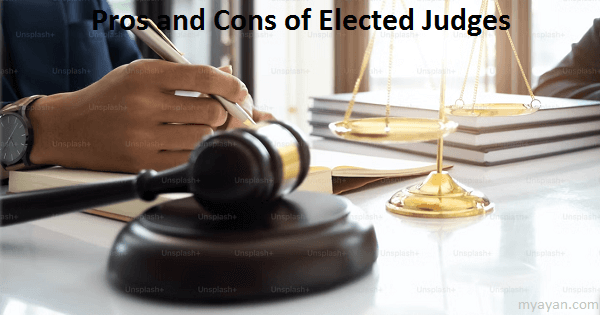Judges play a crucial role in ensuring the fair administration of justice in our society. They are responsible for interpreting and upholding the law, resolving disputes, and protecting individual rights. Most states in the US have adopted systems of electing judges, as opposed to having them appointed by the governor or other elected officials. However, the method of selecting judges can vary greatly depending on the jurisdiction. In some states, judges are appointed, while in others, they are elected. The pros and cons of elected judges are different based on different states. It’s essential to scale the same for the general public.
The public is the one entertaining many benefits of elected judges. These include:
Elected judges often have more experience working in a courtroom than other judges, allowing them to draw on that experience when making rulings. Lastly, elected judges are typically more accessible to the public than appointed judges.
Since they’re accountable to their constituents, they’re usually willing to take time to answer questions and address concerns about their rulings. This could help foster a sense of trust between citizens and the courts and promote dialogue that can lead to better decisions in the long run.
When judges are elected, they must answer to the voters if they fail in their duties or if their decisions are unpopular. This provides an additional level of accountability for judges and helps ensure that they act in the best interests of the public.
Electing judges is generally more accessible than other forms of selecting them, as it allows anyone with a valid voter registration to participate in the process. This makes it easier for people who may not otherwise have access to judicial selection processes to take part in choosing their representatives.
Electing judges is a democratic process, and it allows the public to have a say in who represents them in the justice system. This promotes democratic principles and makes sure that everyone’s voice is heard.
Elected judges cost less than appointed ones, saving governments millions in taxpayer dollars. As a result, elected judges can be considered one of the most fiscally responsible ways to ensure justice for citizens. In addition, since elected judges must continually campaign for re-election, they're constantly focused on ensuring they uphold the highest standard of fairness and justice in their cases. This can help ensure that all citizens have access to an unbiased court system, regardless of who they are or where they come from.
In contrast to the benefits, there are Cons of Elected Judges that general voters should be aware of.
Judges who are elected face the risk of succumbing to political pressure and the sway of interest groups or campaign donors. These external forces have the potential to undermine the fairness and autonomy of the judiciary, resulting in biased or unjust rulings. For instance, judges might feel obliged to render decisions that align with public opinion or partisan interests in order to secure re-election.
The cost of running an election for a judge's position can be quite high, especially if contested. This could potentially reduce public funds available for other important services or initiatives.
The electoral process often places greater importance on qualities like charisma and campaign skills rather than legal expertise and judicial competence. As a result, highly qualified candidates who lack political acumen or public appeal may be disregarded, leading to a less competent judiciary. This deficiency in expertise can compromise the quality and integrity of judicial decision-making.
When judges are elected, they can be subject to lobbying and influence from special interest groups who may attempt to sway their decisions in certain cases. This could potentially interfere with the impartiality of the judiciary system.
The public may not be adequately informed about the duties and qualifications required for a judge's position, leading to uninformed votes. This could lead to individuals being elected who are incapable or unqualified for the role.
As can been seen through this blog, there are pros and cons to having elected judges on the bench. In addition to the various advantages they bring to the court, there are also some drawbacks—the fact that politicians may try to influence their decisions being a primary concern. Ultimately, the people of each state must decide what works best for their justice system.
By considering all possible scenarios and actively engaging in the selection process, positive outcomes are more likely. Adjudication can be taken very seriously, as it has tremendous repercussions on our judicial system and society at large; electing qualified judges is an essential step in ensuring a fair and impartial courtroom.

Elected judges have been used to ensure that citizens have a say in who holds positions of power and that only qualified individuals with an understanding of the law can occupy these positions. This system has resulted in a more accountable judiciary and increased public confidence in the justice system.
One primary concern with electing judges is that it can lead to political interference. Since a judge’s decisions may be influenced by those who have donated or campaigned to support them, their choices may not reflect an objective interpretation of the law.
Each state has its own rules and regulations regarding judicial elections. Generally, candidates will launch a campaign to become a judge through campaigning or fundraising. Voters can then cast their ballots directly at polling stations or through absentee voting. The candidate with the most votes wins the election.
While elections are a popular way of selecting judges, some states have adopted other methods. These may include appointments by the governor or legislature or even an independent commission that works with judicial nominating committees to select judges according to their qualifications and legal experience.
Judicial elections help ensure that qualified judges are in place and allow citizens to have a say in who holds positions of power. Additionally, these elections can increase public confidence in the justice system as it has become more transparent and accountable.